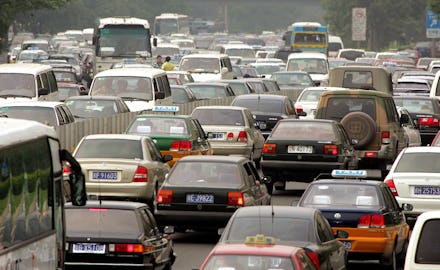The Surprising Way Cars Cause Almost 100,000 American Deaths a Year

It turns out you don't have to be around moving vehicles for cars to kill you. Researchers at MIT have concluded that more people in the U.S. die every year from car pollution than from car accidents. Their study states that 53,000 premature deaths in the U.S. are directly related to car pollution. In contrast, 34,000 people die annually in car accidents. Together, approximately 87,000 premature deaths in the U.S. are related to automobiles.
Of course, cars are not the only source of air pollution. In fact, they produce only 7% of the fine particles that plague our air. However, people's proximity to roadways increases their risk of being adversely affected by car pollution. Air pollution is worse near major roadways, which is directly attributable to automobiles. Approximately one-fifth of the U.S. population lives within one-third of a mile from a roadway. People of color and those in low-income communities are disproportionately likely to live near a major roadway.
This phenomenon is not isolated to the U.S. In April 2012, the same MIT researchers published a study that revealed more people in the UK die from car pollution than from car accidents. They also note that while the risk of air pollution is greater in traffic-congested urban centers such as London, it is not limited to those areas. For example, the study reports that "in some areas on the periphery of the U.K. — such as northern Scotland — almost all air pollution comes from the rest of Europe."
This may make you want to run and hide from cars forever, but there's no point of doing that. If air pollution can reach the Scottish highlands, it can get just about anywhere. Furthermore, even if you never leave your house, small particles are more than capable of getting inside.
Fintan Hurley, the scientific director at the Institute of Occupational Medicine in Edinburgh, suggests, "The main need is to act together to reduce emissions." We may not be able to avoid air pollution today, but we can find a way to stop producing them tomorrow.